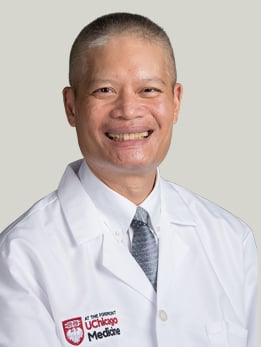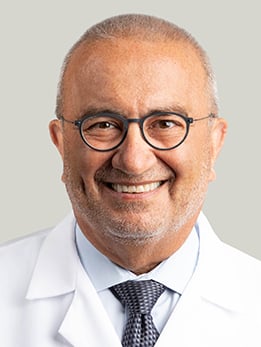Two UChicago Medicine faculty honored by Association of American Physicians
Marshall Chin, MD, MPH, the Richard Parrillo Family Professor of Healthcare Ethics in the Department of Medicine, and Issam A. Awad, MD, MSc, the John Harper Seeley Professor of Surgery and Neurology, have been selected as new members of the Association of American Physicians (AAP). This honorary medical society was founded in 1885 by Sir William Osler and six distinguished colleagues for “the advancement of scientific and practical medicine.”
 Chin is a pioneer in research designed to reduce health disparities and to improve care and outcomes for vulnerable patients. He discovered how culturally tailored quality improvement, chronic care management and patient empowerment can improve diabetes outcomes for vulnerable patients in safety-net clinics.
Chin is a pioneer in research designed to reduce health disparities and to improve care and outcomes for vulnerable patients. He discovered how culturally tailored quality improvement, chronic care management and patient empowerment can improve diabetes outcomes for vulnerable patients in safety-net clinics.
Chin, who was elected to the National Academy of Medicine in 2017, has improved diabetes outcomes among African Americans on Chicago's South Side through health system-community collaborations that address medical and social determinants of health. He co-directs the Robert Wood Johnson Foundation Advancing Health Equity: Leading Care, Payment, and Systems Transformation National Program Office. He also helped create the influential Roadmap to Reduce Disparities, which was cited in the CMS Equity Plan.
“I am honored to be elected to this society,” Chin said. “It supports the principle that objective science and evidence are essential foundations for improving patient care and the health of Americans.”
 Awad studies the molecular mechanisms of cerebral vascular malformations, as well as their biomarkers and therapeutic targeting, leading to the first clinical trials of pharmacotherapy in this disease. He developed minimally invasive techniques to treat hemorrhagic stroke, and led major clinical trials designed to define the optimal surgical benchmarks for success.
Awad studies the molecular mechanisms of cerebral vascular malformations, as well as their biomarkers and therapeutic targeting, leading to the first clinical trials of pharmacotherapy in this disease. He developed minimally invasive techniques to treat hemorrhagic stroke, and led major clinical trials designed to define the optimal surgical benchmarks for success.
Awad’s innovations have defined a paradigm of translational neuroscience. They are changing neurosurgical practice. He has trained scores of neurosurgeons, including current leaders of departments in the U.S. and abroad.
“Since 1885, this prestigious and honorific society has recognized physician-scientists who exemplify the pinnacle of pioneering and enduring contributions to improve health,” Awad said. “I am humbled to be one of the surgeons whose science has gained this level of recognition and impact and honored to be a member of this prestigious group.”
Election to the AAP is limited to 60 persons per year. It is extended to individuals with outstanding credentials in biomedical science or translational biomedical research.
Member goals include the pursuit of medical knowledge, the advancement through experimentation, the recognition of fellow scientists and the establishment of role models to kindle new generations of achievement in medicine and clinical science. The AAP Council encourages investigators who focus on basic, disease-oriented, patient-oriented or epidemiological research leading to innovation, impact and enduring contributions.
